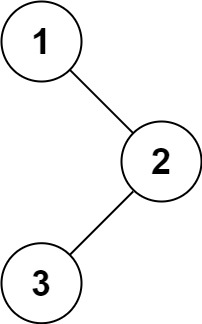94 Binary Tree Inorder Traversal - Easy
Problem:
Given the root of a binary tree, return the inorder traversal of its nodes' values.
Example 1:

Input: root = [1,null,2,3] Output: [1,3,2]
Example 2:
Input: root = [] Output: []
Example 3:
Input: root = [1] Output: [1]
Constraints:
- The number of nodes in the tree is in the range
[0, 100]. -100 <= Node.val <= 100
Follow up: Recursive solution is trivial, could you do it iteratively?
Problem Analysis:
- Time Complexity: O(N) where N is the number of nodes
- Space Complexity: O(H) where H is the height of the binary tree
Solutions:
Recursion
# Definition for a binary tree node.
# class TreeNode:
# def __init__(self, val=0, left=None, right=None):
# self.val = val
# self.left = left
# self.right = right
class Solution:
def inorderTraversal(self, root: Optional[TreeNode]) -> List[int]:
result = []
self.inorder_recur(root, result)
return result
def inorder_recur(self, node, result):
if node:
# Traverse left subtree
self.inorder_recur(node.left, result)
# Visit the root node
result.append(node.val)
# Traverse right subtree
self.inorder_recur(node.right, result)
Iterative
# Definition for a binary tree node.
# class TreeNode:
# def __init__(self, val=0, left=None, right=None):
# self.val = val
# self.left = left
# self.right = right
class Solution:
def inorderTraversal(self, root: Optional[TreeNode]) -> List[int]:
result = []
stack = []
current = root
while current or stack:
# Traverse as left as possible, pushing nodes onto the stack
while current:
stack.append(current)
current = current.left
current = stack.pop()
result.append(current.val)
# Move to the right child of the popped node
current = current.right
return result```
## Similar Questions
 Walter Teng.
Walter Teng.